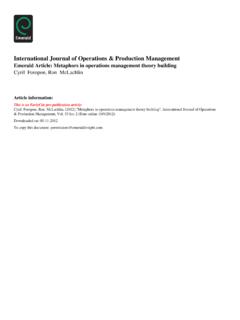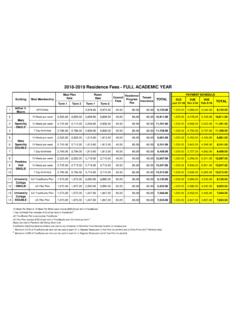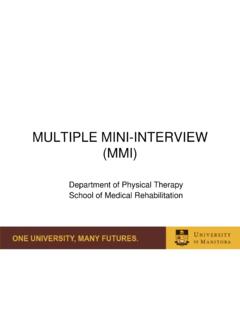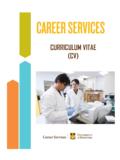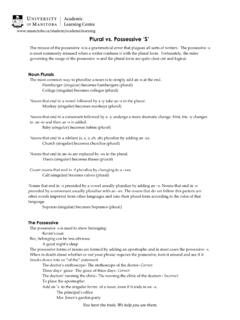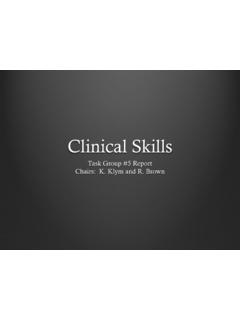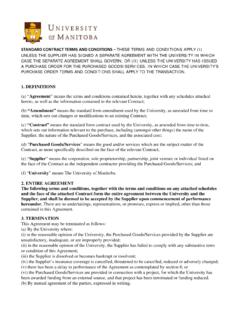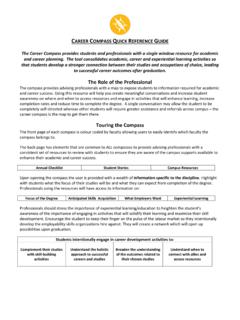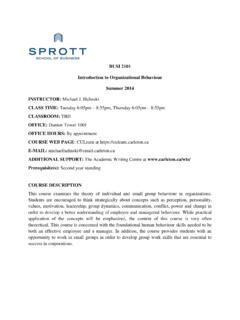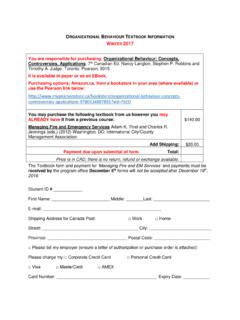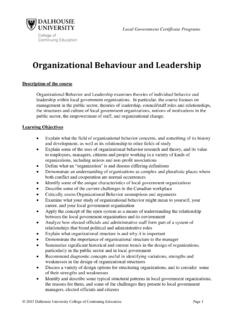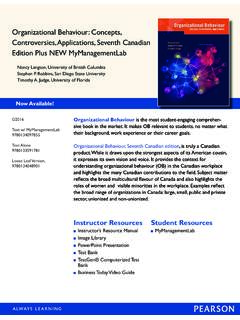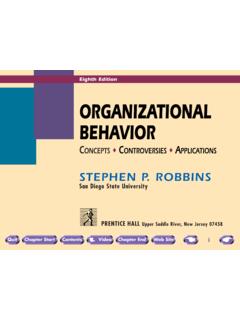Transcription of Course outline GMGT 2070 A05 INTRODUCTION TO ...
1 1 Course outline GMGT 2070 A05 INTRODUCTION TO organizational BEHAVIOUR The University Of Manitoba I. H. Asper School Of Business Department Of Business Administration Winter 2017 INSTRUCTOR: Anastasia Sizykh EMAIL: CLASS SCHEDULE: Jan 18, 2017 - Apr 21, 2017, Wednesday, 2:30 pm - 5:15 pm LOCATION: Drake 103 (Check Aurora prior to the first class to confirm the classroom) OFFICE HOURS: by appointment only ( ) 371B (graduate studies area) PRE-REQUISITES: No prerequisites are required for this Course . TEXTBOOK: Langton N., Robbins, , & Judge, Fundamental of organizational Behavior , Seventh Canadian Edition. Earlier editions are acceptable. Course DESCRIPTION organizational behavior is studies how people think and behave in organizational settings, and how their affects, cognitions and behaviors relate to organizational outcomes. Learning the concepts included in the Course , such as motivation, leadership, personality and so on, will help you in your future courses related to the life of organizations as they provide a foundation for understanding macro processes.
2 This introductory Course is also a first step towards understanding how organizations work, so that you could apply this knowledge in your own professional life. The Course is a mixed format of lectures, in-class activities, and assignments. Course OBJECTIVES 1. Students will gain knowledge about major organizational behaviour concepts. 2. Students will learn to contrast and compare various theories in organizational behaviour. 3. Students will learn to apply their knowledge in exercises, case-studies, and real-life situations. 4. Students will learn to critically evaluate opinions on the nature of organizational behaviour. LEARNING OUTCOMES 1. When faced with a challenge or issue at a workplace ( , poor leadership, high turnover, lack of motivation, etc.), you will be able to evaluate its causes and consequences from the perspectives of different theories. 2. You will be able to foresee problematic situations or work arrangements in organizations, and eliminate them before they develop into a major problems.
3 3. You will be able to identify several solutions to the problems you might encounter as an employee, a leader, or an entrepreneur. 4. You will learn about ways to improve your current job. 5. You will learn to assess information you encounter, such as theories, papers, opinion articles, in a critical manner. 6. You will learn to read academic articles and extract relevant information effectively. Course REQUIREMENTS 2 1. Langton et al. organizational Behaviour: Concepts, controversies , Applications, 7th Cdn ed. 2. Socrative account and phone/desktop app ( ) 3. Additional materials will be uploaded on UM Learn prior to the class ADDITIONAL RESOURCES 1. Dhann, S., (2001) How to .. 'Answer assignment questions' ( ) 2. Descriptive vs Critical writing ( ) SCHEDULE Date Topic Deliverables 1 January 18 INTRODUCTION to organizational behavior Chapter 1 from the assigned textbook Chapter 1 from Bowditch, J. L., Buono, A.
4 F., & Stewart, M. M. (2007). A primer on organizational behavior. Wiley. (will be uploaded to UMLearn). 2 January 25 Managing demographic and cultural diversity Chapter 3 from the assigned textbook Cox, T. H., & Blake, S. (1991). Managing cultural diversity: Implications for organizational competitiveness. The Executive, 45-56. (optional) A. Fertig, "How to tap dance around illegal interview questions," US News & World Report, accessed January 1, 2017, 3 February 1 Individual differences and perception Chapter 2 (pp. 36-56) from the assigned textbook Spain, S. M., Harms, P., & LeBreton, J. M. (2014). The dark side of personality at work. Journal of organizational Behavior, 35(S1), S41-S60. Big Five personality test: 4 February 8 Individual attitudes and behaviours Chapter 3 (pp. 92-101) from the assigned textbook Goffee, R., & Jones, G. (2013). Creating the best workplace on earth.
5 Harvard business review, 91(5), 98-106. February 12 Assignment #1 Analysis of articles 5 February 15 Managing stress and emotions Chapter 2 (pp. 57-69) from the assigned textbook 3 Ashkanasy, N. M., & Daus, C. S. (2002). Emotion in the workplace: The new challenge for managers. The Academy of Management Executive, 16(1), 76-86. February 22 Spring break 6 March 1 Motivation Chapter 4 & Chapter 5 from the assigned textbook Job Diagnostics Questionnaire (will be uploaded to UMLearn) Bailey, C., & Madden, A. What makes work meaningful Or meaningless. MIT Sloan Management Review, 1-9. March 8 Mid-term 7 March 15 Communication Chapter 7 from the assigned textbook Snyder, R. A., & Morris, J. H. (1984). organizational communication and performance. Journal of Applied Psychology, 69(3), 461. 8 March 22 Managing groups and teams Chapter 6 from the assigned textbook Malhotra, A., Majchrzak, A., & Rosen, B. (2007).
6 Leading virtual teams. The Academy of Management Perspectives, 21(1), 60-70. 9 March 29 Conflict and negotiations Chapter 9 from the assigned textbook Jehn, K. A., & Mannix, E. A. (2001). The dynamic nature of conflict: A longitudinal study of intragroup conflict and group performance. Academy of management journal, 44(2), 238-251. April 2 Assignment #2 Reflection on personal experience 10 April 5 Leadership Chapter 11 from the assigned textbook Yammarino, F. J., Dansereau, F., & Kennedy, C. J. (2001). A multiple-level multidimensional approach to leadership: Viewing leadership through an elephant's eye. organizational Dynamics. 11 April 12 Power and politics Chapter 8 from the assigned textbook Randall, M. L., Cropanzano, R., Bormann, C. A., & Birjulin, A. (1999). organizational politics and organizational support as predictors of work attitudes, job performance, and organizational citizenship behavior. Journal of organizational behavior, 159-174.
7 4 12 April 19 organizational culture, structure, and change Chapter 10 & 14 from the assigned textbook Anand, N., & Daft, R. L. (2006). What is the right organization design?. Available at SSRN 961013. Katzenbach, J. R., Steffen, I., & Kronley, C. (2012). Cultural change that sticks. Harvard Business Review, 90(7), 8. April 30 Assignment #3 Case-study TBD Final exam ASSESSMENT 10% Quizzes 10% Participation 10% Assignment #1 10% Assignment #2 10% Assignment #3 25% Mid-term exam 25% Final exam 2 % Bonus for participating in research project Quizzes Short quizzes containing multiple choice questions will be administered at the beginning of each class. You will be asked to answer about 10 questions based on the assigned readings (chapters and articles). The goal of these quizzes is to help you prepare better for the final exam and to provide feedback on your learning progress throughout the Course . Participation There are two components of participation: partaking in class discussions and group work.
8 There will be several group exercises/case-study analyses during the Course where you will be required to work in the assigned groups. At the end of the class, all team members will be evaluated by his or her group peers (preparedness for the class discussion and contribution to the discussion). The evaluations will be averaged and counted towards you participation grade. After each case-study/exercise, there will be a class discussion. Your participation asking questions, responding to questions, providing comments will be noted. You are also expected to be present and active throughout the entire class. Assignment #1 In the first assignment, you will be asked to select one topic covered in the Course up to that point (Classes 2-4), identify three newspaper articles published recently (no older than early 2016) that provide a discussion of these topics, and discuss what you agree and disagree with. For example, these articles might be providing insights on aspects of topic not covered in class, critique the theories we discussed in class, describe events related to the topics covered in class, and so on.
9 Avoid articles that talk about theories and cases that have already been covered in class look for something new and interesting! Then provide a critique of these articles by highlighting one or two points you agree with and one or two points you would like to challenge. You will be evaluated on the following criteria: number of articles selected, quality of the selected articles (look for respected sources, such as HBR, NY Times, etc.), relevance of the articles, brief description of 5 articles contents, clarity of the critique arguments, and structure of the essay. Make sure that the assignment is spell-and grammar-checked. The word limit is 1000-1500 words. There will be penalties for poor grammar, typos, and going over the word limit ( point depending on the severity of issues). The due date is February 12 (11:59 pm). Upload your submission to UMLearn. Late submissions will not be accepted.
10 Assignment #2 Your task in Assignment #2 is to reflect on your personal experience in an organization. We will have covered many topics by the due date of the assignment and that should give you some ideas of the kinds of issues the area of organizational behaviour deals with. Some of them are low motivation, dissatisfaction with the job, poor performance, and so on. Pick an issue you have personally experienced and discuss (1) the nature of the issue; (2) the factors that you think contributed to the problem; (3) if you were in a leadership position, how would you solve the situation? You will be evaluated on the following criteria: minimum of two and maximum of four issues identified and described, quality of the proposed solution, clarity of the discussion, use of the Course materials or additional materials such as peer-reviewed articles or publications in respected journals, critical evaluation of these materials, relevance to the organizational behaviour area and structure of the essay.
